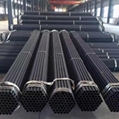| Model: | - |
|---|---|
| Brand: | - |
| Origin: | Made In China |
| Category: | Metallurgy , Mining & Energy / Metallurgy & Mining / Piping Tubing |
| Label: | stainless steel , stainless pipe , stainless steel tube |
| Price: |
US $650
/ T
|
| Min. Order: | 3 T |
| Last Online:30 Jul, 2020 |
Stainless steel pipe is a long hollow circular steel pipe. It is mainly used in petroleum, chemical, medical, food, light industry, machinery and other industrial pipeline instrumentation and mechanical structural components. In addition, when the bending and torsion strength are the same, its weight is lighter, so it is widely used as furniture, kitchenware and so on.
Production process of stainless steel seamless pipe:
A. Round steel preparation→B. Heating→C. Hot rolled perforation → D. Cutting head → E. Pickling → F. Grinding → G. Lubrication → H. Cold Rolling → I. Degrease → J. Solution heat treatment → K. Straightening → L. Tube cutting → M. Pickling → N. Finished goods inspection.
Standard:
China Standard: GB/T14975, GB/T14976, GB13296
ASTMA312-----American Society for Testing and Materials Standards
JISG3459--------Japanese Industrial Standards
Purpose:
For the mechanical structure, the fluid pipes, boiler super heater, heat ex-changers, condensers, catalytic tubes.
The main production steel grades:
0Cr18Ni9, 0Cr25Ni20, 0Cr18Nil0Ti, 00Cr17Nil4Mo2, 0Crl8Nil2Mo2Ti, 1Crl8Ni9Ti, 304, 304L, 316L, 321, SUS304、SUS304L, SUS316L, SUS321.
FAQ
1. What is the weight format for stainless steel pipes?
Weight kg per meter = (outside diameter-wall thickness)*wall thickness*0.02491
2. Why does 304 stainless steel pipe leak?
Chloride poisoning. Why tap water contains chlorine is not explained here. The corrosion resistance of stainless steel is due to the formation of an extremely thin, adhesive and translucent chromium oxide film on the surface of stainless steel. Once the film is damaged, the chemical reaction between chromium in steel and oxygen in the atmosphere can quickly restore the film, and at the same time, mechanical damage can quickly generate a protective film. However, if it is chemically attacked by ions, especially chloride ions, it will dissolve rapidly and corrode, resulting in needle-like or punctate metal surfaces with certain depth of pores, which is called pitting corrosion. The mechanism of this pitting is that ions in neutral solution, such as chloride ions, act on the surface passivation film, and the surface film is damaged, so pitting occurs, and the uneven parts of metal structure such as microstructure and inclusions are easy to become pitting sources Of course, there are many other forms of corrosion on austenitic stainless steel, such as crevice corrosion, stress corrosion and so on. Austenitic stainless steel is extremely sensitive to chloride ion pair, which can happen in a short time if the temperature and concentration are appropriate. Therefore, the relevant standards and specifications clearly require that the concentration of chloride ions in the test water should be strictly required when the pressure vessel made of austenitic stainless steel is subjected to hydrostatic test, and the water should be drained and dried after the test. So as to avoid corrosion of stainless steel caused by chloride ions in residual moisture.
3. What problems should be paid attention to when storing stainless steel pipes?
Of course, the first step for storing stainless steel pipes is to select a suitable warehouse. The suitable site is generally clean and needs smooth ventilation and exhaust. It should be as far away from harmful gas sources and dust sources as possible. There shall be no acid, alkali, salt, cement, industrial reagent and other articles near the stainless steel pipe. In addition, moisture-proof measures should be put in place in the warehouse. Generally, closed warehouses should be adopted for stainless steel pipe warehouses.









